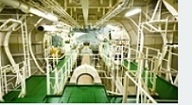
Machinery Maintenance - Safety Precautions & Housekeeping
The responsibilities of the marine engineer are rarely confined to the
machinery space. Different companies have different practices, but
usually all shipboard machinery, with the exception of radio equipment,
is maintained by the marine engineer. Electrical engineers may be
carried on very large ships, but if not, the electrical equipment is also
maintained by the engineer.

